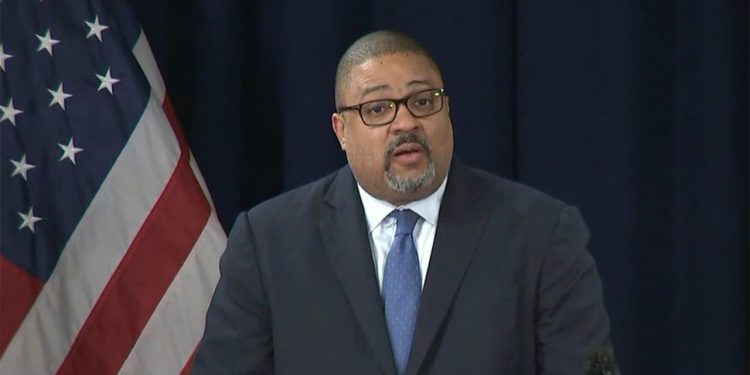
Former President Donald Trump pleaded not guilty in New York City on Tuesday to 34 counts of falsifying business records in the first degree. The charges carry a maximum sentence of 136 years in prison, though the actual sentence will likely be far less than that if he is convicted on any or all counts.
Falsifying business records is typically a misdemeanor charge in New York but rises to the level of a felony with a maximum four-year sentence when a defendant’s ‘intent to defraud includes an intent to commit another crime or to aid or conceal the commission thereof.’
Manhattan District Attorney Alvin Bragg was asked by reporters at a press conference on Tuesday afternoon why the second concealed crime was not specified in the indictment.
‘Let me say as an initial matter that the indictment doesn’t specify it because the law does not so require. In my remarks, I mentioned a couple of laws which I will highlight again now,’ Bragg said. ‘The first is New York state election law, which makes it a crime to conspire to promote a candidacy by unlawful means. I further indicated a number of unlawful means, including additional false statements, including statements that were planned to be made to tax authorities. I also noted the federal election law cap on contribution limits.’
Bragg accused Trump and his associates of employing a ‘catch and kill’ scheme to bury potentially damaging information ahead of the 2016 election.
‘TRUMP then went to great lengths to hide this conduct, causing dozens of false entries in business records to conceal criminal activity, including attempts to violate state and federal election laws,’ Bragg alleged. ‘In total, 34 false entries were made in New York business records to conceal the initial covert $130,000 payment.’
The indictment comes after a years-long investigation by Manhattan prosecutors into hush-money payments that the former president allegedly made to adult film actress Stormy Daniels and former Playboy model Karen McDougal. Both women have alleged that they had affairs with Trump, which he denies.
Federal prosecutors in the Southern District of New York decided in 2019 not to charge Trump with any crimes related to the payments. An investigation by the Federal Election Commission was also closed without any charges.
Trump, the leading Republican candidate in the 2024 presidential election, has called the investigation ‘Political Persecution and Election Interference at the highest level in history.’
Aside from Bragg’s investigation, Trump is also being investigated by a prosecutor in Fulton County, Georgia, for his alleged attempts to overturn the 2020 presidential election result in that state; and federal investigations led by a special counsel are probing Trump’s handling of classified documents and his alleged attempts to overturn his 2020 election defeat nationwide.
Fox News’ Brooke Singman, Bill Mears and Jake Gibson contributed to this report.

Former President Donald Trump pleaded not guilty in New York City on Tuesday to 34 counts of falsifying business records in the first degree. The charges carry a maximum sentence of 136 years in prison, though the actual sentence will likely be far less than that if he is convicted on any or all counts.
Falsifying business records is typically a misdemeanor charge in New York but rises to the level of a felony with a maximum four-year sentence when a defendant’s ‘intent to defraud includes an intent to commit another crime or to aid or conceal the commission thereof.’
Manhattan District Attorney Alvin Bragg was asked by reporters at a press conference on Tuesday afternoon why the second concealed crime was not specified in the indictment.
‘Let me say as an initial matter that the indictment doesn’t specify it because the law does not so require. In my remarks, I mentioned a couple of laws which I will highlight again now,’ Bragg said. ‘The first is New York state election law, which makes it a crime to conspire to promote a candidacy by unlawful means. I further indicated a number of unlawful means, including additional false statements, including statements that were planned to be made to tax authorities. I also noted the federal election law cap on contribution limits.’
Bragg accused Trump and his associates of employing a ‘catch and kill’ scheme to bury potentially damaging information ahead of the 2016 election.
‘TRUMP then went to great lengths to hide this conduct, causing dozens of false entries in business records to conceal criminal activity, including attempts to violate state and federal election laws,’ Bragg alleged. ‘In total, 34 false entries were made in New York business records to conceal the initial covert $130,000 payment.’
The indictment comes after a years-long investigation by Manhattan prosecutors into hush-money payments that the former president allegedly made to adult film actress Stormy Daniels and former Playboy model Karen McDougal. Both women have alleged that they had affairs with Trump, which he denies.
Federal prosecutors in the Southern District of New York decided in 2019 not to charge Trump with any crimes related to the payments. An investigation by the Federal Election Commission was also closed without any charges.
Trump, the leading Republican candidate in the 2024 presidential election, has called the investigation ‘Political Persecution and Election Interference at the highest level in history.’
Aside from Bragg’s investigation, Trump is also being investigated by a prosecutor in Fulton County, Georgia, for his alleged attempts to overturn the 2020 presidential election result in that state; and federal investigations led by a special counsel are probing Trump’s handling of classified documents and his alleged attempts to overturn his 2020 election defeat nationwide.
Fox News’ Brooke Singman, Bill Mears and Jake Gibson contributed to this report.
















